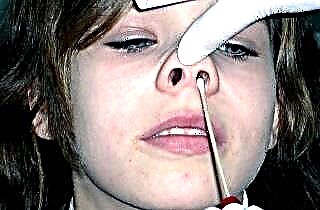Clicks in the ear when swallowing can be present in completely healthy people. This is due to the periodic contraction of muscle fibers that are involved in the work of the ear or auditory tube. In the event that these contractions are rare, are not accompanied by the development of additional symptoms, then they should not cause concern.
In all other cases, the patient must apply for an appointment with a medical institution to clarify the diagnosis and determine the treatment tactics. First of all, this applies to those cases when additional symptoms are malaise, pain syndrome, fever.
Inflammatory processes in the ear
 Unpleasant sensations in the ear can be a sign of pathology of the ear itself, when, as a result of the inflammatory process, catarrhal or exudative inflammation develops in the middle ear cavity. The pain syndrome is constant, aggravated in the supine position.
Unpleasant sensations in the ear can be a sign of pathology of the ear itself, when, as a result of the inflammatory process, catarrhal or exudative inflammation develops in the middle ear cavity. The pain syndrome is constant, aggravated in the supine position.
In a horizontal position, the swelling of the auditory tube increases, which aggravates the symptoms.
However, an increase in this symptom can also be observed when swallowing, which is also due to the accumulation of mucus in the Eustachian tube or middle ear cavity. Concomitant symptoms are hearing loss, fever, general malaise, nasal congestion, rhinitis.
If there are additional signs, the cause when it clicks in the ear when swallowing is obvious. The otolaryngologist should clarify the diagnosis. After conducting an otoscopy, the specialist will detect objective changes in the eardrum, indicating the development of an inflammatory process in the middle ear. The prescribed treatment for otitis media will help to ensure that the clicks in the ear when swallowing disappear within a few days.
The main drugs used in this case are nasal drops with a vasoconstrictor effect, dry heat. To reduce pain, non-steroidal anti-inflammatory drugs are used internally. If necessary, antibiotics may be prescribed by an otolaryngologist. Also, the appointment of ear drops should be agreed with a specialist.
Joint pathology
Clicks in the ears when swallowing can also be caused by the following pathologies:
- arthrosis and arthritis of the temporomandibular joint;
- violation of the bite.
Changes in the temporomandibular joint can be caused by destructive processes occurring in the bones with age. In this case, large joints are most often affected in patients, on which the maximum load was for a long time. This usually applies to the spine, knee and hip joints. Much less often small joints are affected, including those that ensure the work of the jaws.
The development of deforming osteoarthritis with damage to the temporomandibular joint develops gradually and is characterized by more pronounced clinical manifestations in old age. It is characteristic for this to have stiffness when chewing in the morning, which passes during the day. When swallowing clicks in the ears, the pain syndrome is not pronounced.
 Over time, the symptomatology develops, there is pain when chewing. This forces the patient to go around the other side when eating food. It is possible to explain why it clicks in the ear when swallowing, based on the picture of the changes taking place. Destructive processes occurring in the bones of the joint lead to impaired mobility in it. This is manifested by the development of this symptom.
Over time, the symptomatology develops, there is pain when chewing. This forces the patient to go around the other side when eating food. It is possible to explain why it clicks in the ear when swallowing, based on the picture of the changes taking place. Destructive processes occurring in the bones of the joint lead to impaired mobility in it. This is manifested by the development of this symptom.
The course of the disease with this localization of the process has a relatively benign course, the symptoms grow slowly. Such a pathology rarely leads to immobilization and the development of disability. This diagnosis is supported by
- old age of the patient;
- slowly, over the course of several years, increasing symptoms;
- satisfactory general condition of the patient;
- temperature indicators within normal limits;
- no changes in the skin of the parotid region;
- otoscopic picture within normal limits.
You can confirm the diagnosis using hardware techniques, such as magnetic resonance imaging and computed tomography, X-ray examination.
Treatment of this condition will consist in the use of non-steroidal anti-inflammatory drugs. Good results are achieved when using physiotherapeutic procedures on the area of the affected joint. However, the use of these procedures may be limited due to the presence of concomitant diseases in the patient, such as hypertension, cardiovascular disease, diabetes mellitus, etc.
The development of arthritis in this joint is most typical at a young age.
Most often, the disease is a complication or manifestation of severe infectious, rheumatic and rheumatological processes.
Evidence of the involvement of this joint in the process is the presence of edema and redness of the skin. On palpation, a local increase in temperature is noted.
Depending on the cause of the joint damage, treatment methods can be varied. Most often these are antibacterial agents, non-steroidal anti-inflammatory drugs, both external and systemic action, corticosteroids, etc.
Malocclusion
 The reason, when when swallowing in the ear clicks, may be malocclusion. As a result of the uneven closing of the jaws, the load on the temporomandibular joint is redistributed. The bones that form it, the ligamentous apparatus, the muscles work with increased stress. Over time, this leads to discomfort in this joint, the development of certain symptoms. The first symptom of concern for the patient is a clicking sound in the ear when swallowing. Over time, a decrease in joint mobility may develop, a headache, dizziness may appear, and bruxism may develop, that is, uncontrolled gnashing of teeth.
The reason, when when swallowing in the ear clicks, may be malocclusion. As a result of the uneven closing of the jaws, the load on the temporomandibular joint is redistributed. The bones that form it, the ligamentous apparatus, the muscles work with increased stress. Over time, this leads to discomfort in this joint, the development of certain symptoms. The first symptom of concern for the patient is a clicking sound in the ear when swallowing. Over time, a decrease in joint mobility may develop, a headache, dizziness may appear, and bruxism may develop, that is, uncontrolled gnashing of teeth.
In addition, to explain why, when you swallow, it clicks in your ears, there can be problems with prosthetics and even incorrect filling of a tooth. The use of a removable or permanent prosthesis, implantation of an implant are those procedures that, if carried out incorrectly, are a source of a violation of the teeth closing, the development of a pathological occlusion and, as a consequence, the appearance of this symptom.
If, when swallowing, it clicks in the ear, and this symptom appears some time after the dental procedure, a second consultation with a specialist is necessary. The promo code bonus is increased by 30%: you will receive free spins, as well as an increase in the welcome bonus. 1xSlots Casino No Deposit Bonus Each code has its own expiration date. That is why it is important not to hesitate to activate, otherwise you will miss out on the opportunity to receive a promotion from the casino. There are several ways to get a bonus code for a 1xslots casino: Newsletter. When registering, a new client is invited to subscribe to receive letters from 1xslots. You can also activate the mailing after opening an account in your personal account.
This symptom can only be an initial sign indicating the development of pathology of the temporomandibular joint. With the progression of the process, this pathology will be reflected in the patient's appearance, asymmetry of the face may be noted. All this, combined with headache, dizziness, periodic gnashing of teeth, creates a serious reason for the need to solve this problem.
To clarify the diagnosis, the same techniques can be proposed as for suspected arthrosis of the temporomandibular joint. With regard to corrective measures, most often they use braces, mouth guards for bruxism, modern prosthetics.



